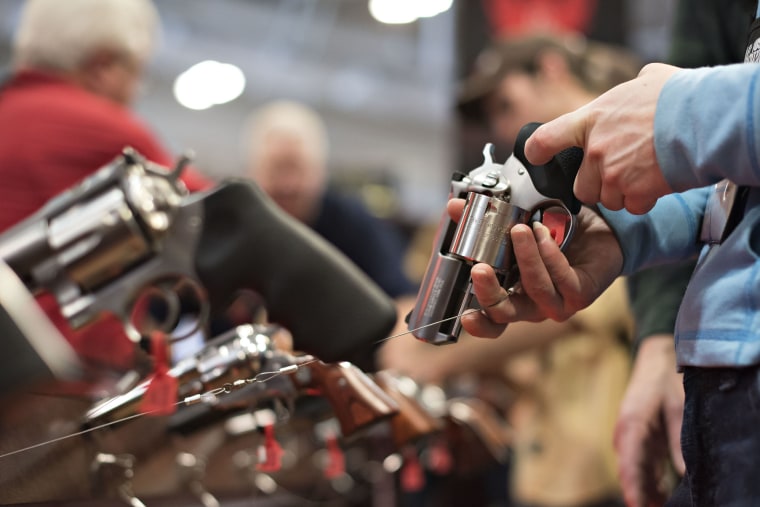Late last week, before the latest mass shooting in Texas left seven dead and 25 injured, Quinnipiac released the latest results on public attitudes on gun reforms, which left little doubt about Americans' appetite for action.
Congress needs to do more to reduce gun violence say 72 percent of voters, including 50 percent of Republicans, 93 percent of Democrats, and 75 percent of independents. [...]"In a country gripped by political polarization, American voters are united in their message to Congress: do more to reduce gun violence," adds Mary Snow [Polling Analyst for the Quinnipiac University Poll].
The closer one looked at the specific results, the more one-sided they appeared: 93% support universal background checks, 82% support requiring a license to purchase a gun; 60% support a ban on assault weapons; and 46% support a mandatory buyback of assault weapons.
And on that last point, while 46% obviously isn't a majority, that's a striking level of support for a provocative and fairly new idea that wasn't really a major part of public debate as of a month ago.
As for mandatory licensing, when Al Gore proposed something similar two decades ago, the right used his position as a cudgel with which to beat him. Now, the idea enjoys 82% support -- in an era in which very few ideas enjoy the backing of 82% of the country.
And yet, even as I type this, I know that we're all thinking roughly the same thing: the odds of major gun reforms passing anytime soon are poor. Sure, 93% of Americans want universal background checks, and in theory that should be enough to prompt swift political action, but it's clear that action is unlikely.
It's worth reflecting from time to time on the disconnect between what the public supports and what the public gets on this issue.
As regular readers know, it seems inexplicable at first blush. Politicians want to get re-elected, which generally means taking popular steps voters are inclined to like, and yet Republicans are convinced that they'll pay no price whatsoever for ignoring public will on curtailing gun violence -- and if recent history is any guide, most of them are probably correct.
Amber Phillips had a good piece on this last week, noting some of the key factors, including better organization on the right going back decades, but I wanted to circle back to a related point about polling on this issue.
What the data often fail to show is depth of commitment: voters like the idea of new safeguards in the abstract, but come Election Day, they have a series of priorities, and issues like background checks fade into the background. Being asked about a preference is a lot different than basing one's vote on an issue.
Democrats have largely persuaded the American mainstream on the merit of a variety of reform ideas, but the second half of the battle is more complicated: making the transition from passive agreement to genuine passion for constructive change.
Four years ago, Barack Obama made a spirited case on behalf of single-issue voting.
"[W]e've got to change the politics of this. And that requires people to feel – not just feel deeply – because I get a lot of letters after this happens. 'Do something!' Well, okay, here's what you need to do."You have to make sure that anybody who you are voting for is on the right side of this issue. And if they're not, even if they're great on other stuff, for a couple of election cycles you've got to vote against them, and let them know precisely why you're voting against them. And you just have to, for a while, be a single-issue voter because that's what is happening on the other side."And that's going to take some time. I mean, the NRA has had a good start. They've been at this a long time, they've perfected what they do. You've got to give them credit -- they're very effective, because they don't represent the majority of the American people but they know how to stir up fear; they know how to stir up their base; they know how to raise money; they know how to scare politicians; they know how to organize campaigns. And the American people are going to have to match them in their sense of urgency if we're actually going to stop this."
A few months later, the Democratic president said he would not 'campaign for, vote for or support any candidate, even in my own party, who does not support common-sense gun reform."
The more voters adopt a similar posture, the more likely change will become.
